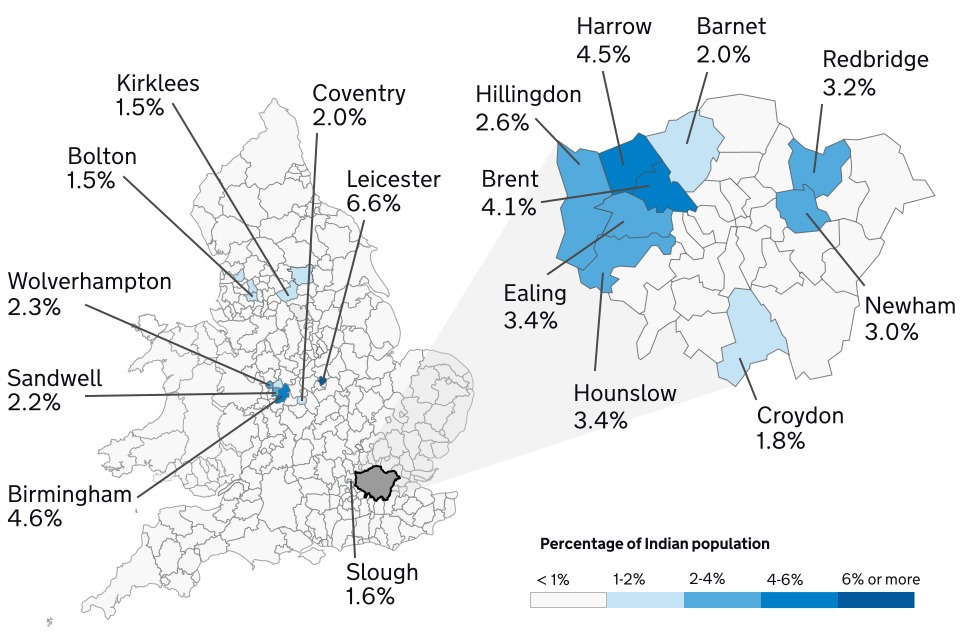The Indian Diaspora is arguably one of the most visible immigrant groups in the UK. Originating from the colonial ties and post-colonial migration, the Indian diaspora in the United Kingdom has emerged as a community that deeply engages in British civic life while retaining close cultural and transnational ties. This article examines the contemporary Political, social and economic influence, origin and future trajectory of the Indian diaspora community in the United Kingdom.
Historical Anchors
The historical footprints of Indians in the United Kingdom extend back to the 18th century, primarily as students and lascars, i.e.Indian maritime workers employed on British ships. Roger Ballard (2003) highlights these early anchors as the foundation of migrant patterns that emerged post-World War II. The middle of the 20th century is considered to be the most notable episode of migration, particularly after India’s independence and decolonisation of Eastern Africa from the 1960s. The major driving force behind this influx was the lack of workers in post-World War Britain, and political unrest in Uganda and Kenya, where, during colonial times, large communities of people of Indian origin were forcefully displaced due to the policy of “Africanisation” (Nair 2018). In addition to these, a notable catalyst to this significant wave of migration was the British Nationality Act of 1948, which granted Commonwealth citizens the right to settle in Britain.
Contemporary Influence
The Indian diaspora in the United Kingdom has transitioned from being a community of immigrants to significant players in every sphere of Britain. People of Indian descent currently hold prominent political positions, including cabinet portfolio roles such as Home Secretary Suella Braverman and Prime Minister Rishi Sunak. This political involvement in the civic life of Britain goes beyond mere representation, impacting migration laws in the UK and facilitating the fostering of closer ties with India.
With high rates of entrepreneurship and higher education, British Indians are one of the most economically successful ethnic communities in the United Kingdom. The Indian diaspora community has made significant contributions to the field of medicine, education and entrepreneurship. The health care sector, particularly, is the most impacted by people of Indian descent (Sheetal Sharma, 2012).
British Indian academicians like Dr. Priya Gopal and Sir Partha Dasgupta have largely shaped post-colonial studies, economics and environment policy. The prevalence of diaspora-led businesses is made apparent by the Mittal Steel, the Hinduja Group and Infosys UK. The prevailing cultural influence is evident through cultural and community organisations. Institutions such as the National Council of British Indians and the Indian League advocate for the interests of the diaspora, while the Nehru Centre in London promotes Indian art, film and literature, facilitating cultural hybridity. The cultural ties between the diaspora and India are reinforced by investments, as well as digital and grassroots activism. India’s economy has benefited mainly from remittances received from the UK and entrepreneurs from the diaspora community, who frequently help with start-up collaboration and technology transfers. Government initiatives like the UK-India Year of Culture highlight common heritage through exhibitions, art, academic exchange, etc, epitomise cultural diplomacy at its core.
Future Pathways
National and global imperatives contour the emergent trajectory of the Indian diaspora in the United Kingdom. Brexit has shaped the demographic flows and civic agency of the diaspora community and is likely to be shaped further by shifting immigration laws and evolving trade relations with India. Concurrently, the second generation British Indians utilise channels like political and civic engagement, artistic expression and digital activism to articulate and reassert their identity (Bhat and Inamdar 2022). The ONS analysis for 2024 indicates that while the new visa regulations implemented by the government are to blame for the increase in return migration, cross-border events like SAHM continue to foster cultural ties. At an advanced stage, the community’s capacity for cross-border engagement and adaptation will be integral to its long-term trajectory as hybrid identities expand in the globalised socio-cultural landscape.
The Indian diaspora in the United Kingdom is not just an economic relocation, but it’s deeply intertwined with the colonial past, policy shifts and cultural negotiations. From colonial subjugation to major contributors in British civic life, the Indian diaspora community has evolved drastically. Its cultural rootedness and contemporary Influence underscore both its strengths and diversity. As the perspective evolves, the diaspora community navigates through dual belonging of sustaining cultural ties with India while also playing a significant role in British civic life. Taken together, the findings underscore the Indian diaspora’s local involvement and global cultural influence. Suggesting a future where diaspora serves as a transnational link between the two countries and political segments within Britain.
References
Ballard, Roger. 2002. “The South Asian Presence in Britain and Its Transnational Connections.” Routledge. https://d-nb.info/1219147117/34.
Nair, Savita. “Despite Dislocations: Uganda’s Indians Remaking Home.” Africa 88, no. 3 (2018): 492–517. https://doi.org/10.1017/S0001972018000190.
Sharma, Sheetal. 2012. “Immigrants in Britain: A Study of the Indian Diaspora.” Diaspora Studies 5 (1): 14–43. https://doi.org/10.1080/09739572.2013.764123
Bhat, Aparna, and Neeta Inamdar. 2022. “Indian Diaspora in Europe and Its Interest Representation in Immigration Policies – the UK as a Case Study.” Edited by Richard Meissner. Cogent Social Sciences 8 (1). https://doi.org/10.1080/23311886.2022.2065150.
Team, Migration Statistics. 2025. “Long-Term International Migration, Provisional.” Ons.gov.uk. Office for National Statistics. May 21, 2025. https://www.ons.gov.uk/peoplepopulationandcommunity/populationandmigration/internationalmigration/bulletins/longterminternationalmigrationprovisional/yearendingdecember2024.



Leave a Reply